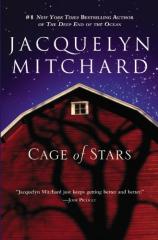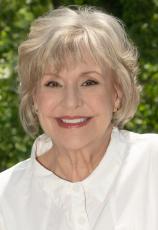Excerpt
Excerpt
Cage of Stars

CHAPTER 1
At the moment when Scott Early killed Becky and Ruthie, I was hiding in the shed.
It wasn't because I was afraid. I wasn't afraid to die then, and I'm not afraid now. It was because we were playing hide-and-seek. My little sisters always started begging me the minute my parents left me to baby-sit. "Ronnie, Ronnie, Ronnie!" they would tease me, pulling on my shirt while I tried to straighten up the kitchen, "Betcha we can find you this time. Betcha on our chores!' And I would always give in, warning them that if they didn't find me, they were going to spend two hours, until Mama got back, picking up every crayon and every sticker book in their room.
"This time I'm not kidding, Thing One and Thing Two,' I told them that day. "I'm not going in there right before Mama gets home and pull all your clean clothes and markers out from under your bed."
"I promise, slalomly," Becky said. I had to laugh. Her teeth were purple from the berries she'd eaten for breakfast. Becky was as thin and fast as a minnow in a creek and seemed to live practically on air. Ruthie was as round and "slalom" as a little koala bear. Her favorite thing was to eat cookie dough right from the bowl.
They wanted to play outside, because it was a really warm, sunny day for November, not that it's ever too cold at the edge of what's practically the Mojave Desert. The purples and yellows and reds of the changing trees that day were as flashy as a marching band.
And so, an hour later, I was crouched down in the shed, behind a big sack of potting soil and a crate of clay, hoping a spider didn't pick that time to crawl up my back. I couldn't see my little sisters. But I imagined that they were leaning against the picnic table, where we ate our supper almost every summer night when the bugs weren't bad - our own tomatoes and sweet corn, sometimes with tacos and black beans -- listening to the birds making their go-to-sleep sounds. Becky and Ruthie most likely had their little hands over their eyes, counting fast so that they could yell out, "Ready or not, here I come!" Ruthie would call first, I knew. She always did, and Becky always shushed her, saying there was no way she could have gotten to a hundred yet because she, Becky, was older and she hadn't got up to fifty. I know they didn't peek, because I'd told them peeking wasn't fair, and that I wouldn't play unless they played fair.
That day, though, they never made a sound.
I figured they were counting to a hundred silently, because whenever we played hide-and-seek, Becky would count straight up as fast as she could, and Ruthie, who was only four, would say out loud, "One, two, three, four, eight, fourteen, fifteen, ten." Becky would get so confused she'd have to start all over again.
But five minutes went by, and still, they never made a sound. When it got to be a long time, I opened the door.
And I saw my sisters, lying there like little white dolls in great dark pools of paint. I saw Scott Early, a young man with short blond hair, sitting on the picnic table, wearing only his underwear, sobbing as if they were his little sisters, as if a terrible monster had come along and done this. Which was sort of what he did think, though I didn't know that then.
It was a good thing, a doctor later said to my mother, that Becky and Ruthie didn't cry out. It meant that they died quickly. They barely felt a thing. They must never have heard Scott Early come walking barefoot across our lawn. The merciful Father shielded them from fear. Being cut across the carotid artery is a very quick way to die. I knew that, even then, from biology. But it's not over in an instant, and I prayed for months that Becky and Ruthie never had time to wonder why I wasn't there to help them. For I was always there to help them.
Though I was only twelve-almost-thirteen, Mama could trust me to look after the little girls alone, even if she had to be out in the part of the shed that was her "studio" or at the galleries, as far away as St. George, for hours at a time.
"You are as responsible as any mother, Ronnie," Mama quietly told me one night, after the time Becky's hand got burned. Becky had been impatient that morning for her "cheesy eggs," and reached up to see if they were finished while I was cooking. She burned her hand on the pan. Mama said I had "presence of mind" because I didn't start to cry or panic when Becky screamed. I didn't try to put butter on the burn, which my own grandma would have done, because that would have made it worse. From the firstaid section of health class Mama taught me, I remembered that a burn had to be cooled down with water right away or the heat inside would keep right on burning the skin and the damage would go deeper. I put Becky's hand under the cold-water tap for five minutes and wrapped ice in a thick towel and taped it down around her hand. Then I ran, pulling Becky and Ruthie in the wooden wagon, down to our nearest neighbor, Mrs. Emory, who drove us to Pine Mountains Clinic ten miles away, between our house and Cedar City. At the clinic, the doctor, a young woman, placed a net shield and gauze under a bandage on Becky's palm. The doctor spoke so gently to Becky that I suppose it was then that I first thought I would become a doctor one day myself. I wondered if the incident meant I was called to it.
Becky had just a tiny scar on one finger after her hand healed. Our pediatrician, Dr. Pratt, said he wouldn't have done one thing different himself, except to drive her to a hospital. But there wasn't a real hospital within fifty miles of where we lived at the foot of a pine-covered ridge. Where we lived wasn't even really a town. It was a sort of settlement, for people like my father, who always said he liked his "elbow room."
And so, on the day they died, unless paramedics could have arrived at our house within minutes; and everyone knew that was impossible, or unless there was a doctor already at our house; and I was just a child, and Mr. Sissinelli, our neighbor, who was a doctor, was at his hospital, no one could have saved my sisters.
I must not feel guilty, Mama and Papa told me over and over, in the days afterward, although I could see in their eyes and hear in their voices that they felt exactly that way themselves. I was not to feel guilty for being unable to call for help until it was too late, or for being unable to get Papa's gun because he was out hunting for quail, they said. By the time I opened the door on the sight that would change me for the rest of my life, it was already too late.
When the police asked questions about why we weren't supervised, my parents spoke up. They defended me and their choice of leaving me to watch my sisters, telling the officers what a responsible girl I was. I had done just what I should have done. I had been brave. They said that not even a parent could have suspected that Scott Early would even find such a remote place, much less grab the weeding scythe Papa had left leaning against the barn and use it like the sword of an avenging angel, striking a death blow in seconds.
I listened and I nodded, but I didn't really believe them. I didn't want to cause Papa, and especially Mama, any more pain, but no one could say I wasn't guilty. My cousins, and my best friends, Clare and Emma, and even goofy boys like Finn and Miko, said the same thing. But it didn't matter. Even after the panic was gone, and the worst of the agony, the guilt was always there. It could never be turned off. The guilt was like using a plain magnifying glass to focus a beam of sunlight, bringing all that heat together, turning something soft and bright into something that could hurt. Even love couldn't dim it. It was the guilt that made my anger like a burn that no one ever ran under cold water; and so it kept burning and burning down to my bones. And as time went by, and other peoples' cooled down, mine did not. It got hotter, and became a part of me, and it didn't heal until long after. Even now, I think the scars must still be there.
Cage of Stars
- Genres: Fiction
- paperback: 336 pages
- Publisher: Grand Central Publishing
- ISBN-10: 0446696722
- ISBN-13: 9780446696722








